My love affair with South Korean food started way back. As a teenager, I grew up in a community dominated by South Korean immigrants in Los Angeles. Many of my high school friends were either
When I studied in college, my roommates were both Koreans Americans. They would often go for a meal in LA’s Korea town or cook Korean meals at home, and lucky for me – they have always taken me along! It was from hanging out with them that I became well-versed in Korean cuisine.
So you can just imagine my excitement when I finally got to visit Seoul many years later. I felt like I was truly on a pilgrimage to food heaven.
- Tips for visiting Seoul
- What to eat in Seoul
- 1. Spicy Korean Ramyun topped with Processed Cheese
- 2. Korean Stuffed Rice Roll (Gimbap)
- 3. Korean Savory Pancake (Jeon)
- 4. Korean Soup
- 5. Korean Street Food
- 6. Korean BBQ
- 7. Dak Galbi from Chuncheon
- 8. Korean Fried Chicken and Beer (Chimaek)
- 9. Makgeolli (Korean Sparkling Rice Wine)
- 10. Patbingsoo (Korean Shaved Ice)
- 11. Banana Milk
- 12. Kalguksu
- Where to stay in Seoul
Travel Tips for Visiting Seoul
Seoul (and South Korea in general) is a very safe and tourist-friendly country. On my first visit to South Korea, I went to Seoul by myself and I had no issues at all!
Here are some tips that would make your trip as easy as mine:
1. K-ETA Visa Waiver – If you qualify for a visa waiver to enter South Korea, you MUST apply for K-ETA at least 72 hours prior to your arrival. Otherwise, you would be denied boarding your flight.
2. T-Money Card – First thing to do in Seoul, prebook a T-Money card and pick it up at Incheon airport. T-Money is the transportation card you can use for public transportation in Seoul. It allows you to use the “tap in tap out” system so you don’t need to buy a ticket each time you take the train or bus. A single journey costs 2,700 won, and you can keep reloading the T-money card as you need.
If you use iPhone, you may not need to get a physically T-Money card. Apple has just announced that they will support T-Money natively from the Apple Wallet app. Stay tuned for further updates!
3. Airport Express Train (AREX) – Get to the city from Incheon Airport by AREX (Airport Express Train), which runs to Seoul station. You cannot use T-money for this, you have to buy the AREX portion separately. But once you get to / out of Seoul station, you can use the T-money card again. You can purchase the AREX tickets here via Klook.
What is Klook? Klook is the leading travel and experiences booking website in Asia. And yes, they are legit! I personally always book my activities through them whenever I am traveling. See my review of Klook here.
There is also an option to take the slow regular train using T-Money for half the price of AREX, but I can’t recommend it since you won’t be saving that much money.
4. Taxis and Car Sharing – Taxi is safe to use in Seoul, and you can just hail off the street. Car sharing app like Uber can also be used in Seoul, or you can try K.RIDE app. Personally, I found the public transport to be sufficient enough that I did not have to use a taxi much while I was in Seoul.
5. eSIM Card – As with any other internation travel, it would also be handy to have an internet connection at all times. I highly recommend eSIM since it’s so much more convenient than SIM card. You can jsut install eSIM digitally, you won’t have to swap your original SIM card.
6. Google Translate – If you don’t speak Korean, download Google Translate and pre-download the Korean language pack so you can translate stuff on the go. Locals will be nice and try to be helpful, but most do not speak English and a translation app can go a long way. Many stores in Myeongdong can accommodate Mandarin though! I suspect this is due to the influx of tourism from mainland China, especially in the beauty sector.
7. Maps – Google Maps is surprisingly not the best app in Seoul. This is because Google stores their data on foreign servers, and given the security threat from the North, South Koreans have been very protective of their data. It still works as GPS and major subways, but you probably won’t be able to get good direction from it. You can use Kakao Maps instead.
Without further ado, here is a round-up of traditional South Korean meals I’ve grown to love over the years.
1. Spicy Korean Ramyeon (라면)
Ramyeon is the Korean version of ramen, a soupy noodle dish. Ramyeon is usually spicy with dark red broth. It is such an excellent comfort food when the weather is cold outside.
The best way to enjoy Ramyeon? Topped with cheese. But not just any cheese, it has to be processed cheese, like Kraft singles! Stay with me here – I know, this sounds weird. I was skeptical when I first heard about it too, but I discovered that processed cheese and Ramyeon work REALLY well together!
In South Korea, as well as among Korean-American immigrants, it’s a common practice to serve a bowl of piping hot Ramyeon with a slice of cheese. The processed cheese would melt and blend with the spicy soup, which gives the dish a slightly creamy texture. The cheese also helps to tone down the heat a little bit. Think of it like… a spicy mac and cheese.
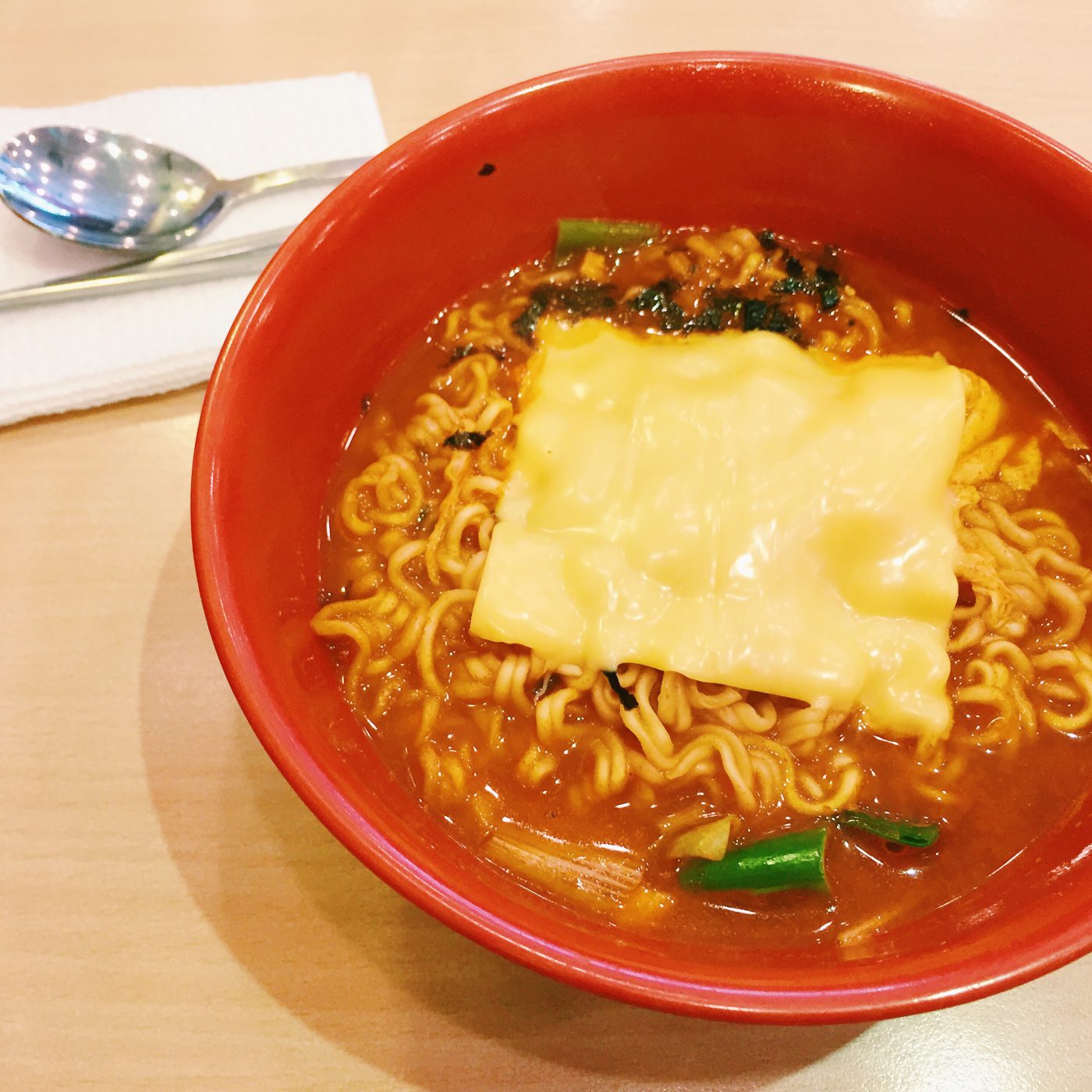
The best part? you can easily replicate this at home. Get yourself a packet of instant Korean Ramyun (I love the Nong Shim or Jin Ramyun brand), cook it as per instruction, but put a slice of kraft singles right before serving. Add Kimchi if you like, and voila! You’ve got yourself a delicious hearty meal. I didn’t say it’s healthy though.
Where to eat Ramyeon in Seoul
- Teumsae Ramyeon in Myeongdong
2. Korean Stuffed Rice Roll (Gimbap – 김밥)
Wanna know the first thing I did when I landed in Seoul? I looked for Gimbap.
Gimbap is a traditional and very comforting Korean snack – its appearance is very similar to maki roll that you can find in Japan, but the two are very different in taste. It is seasoned white rice stuffed with cooked meat and vegetables, rolled on dried seaweed with a thin layer of sesame oil brushed on it.
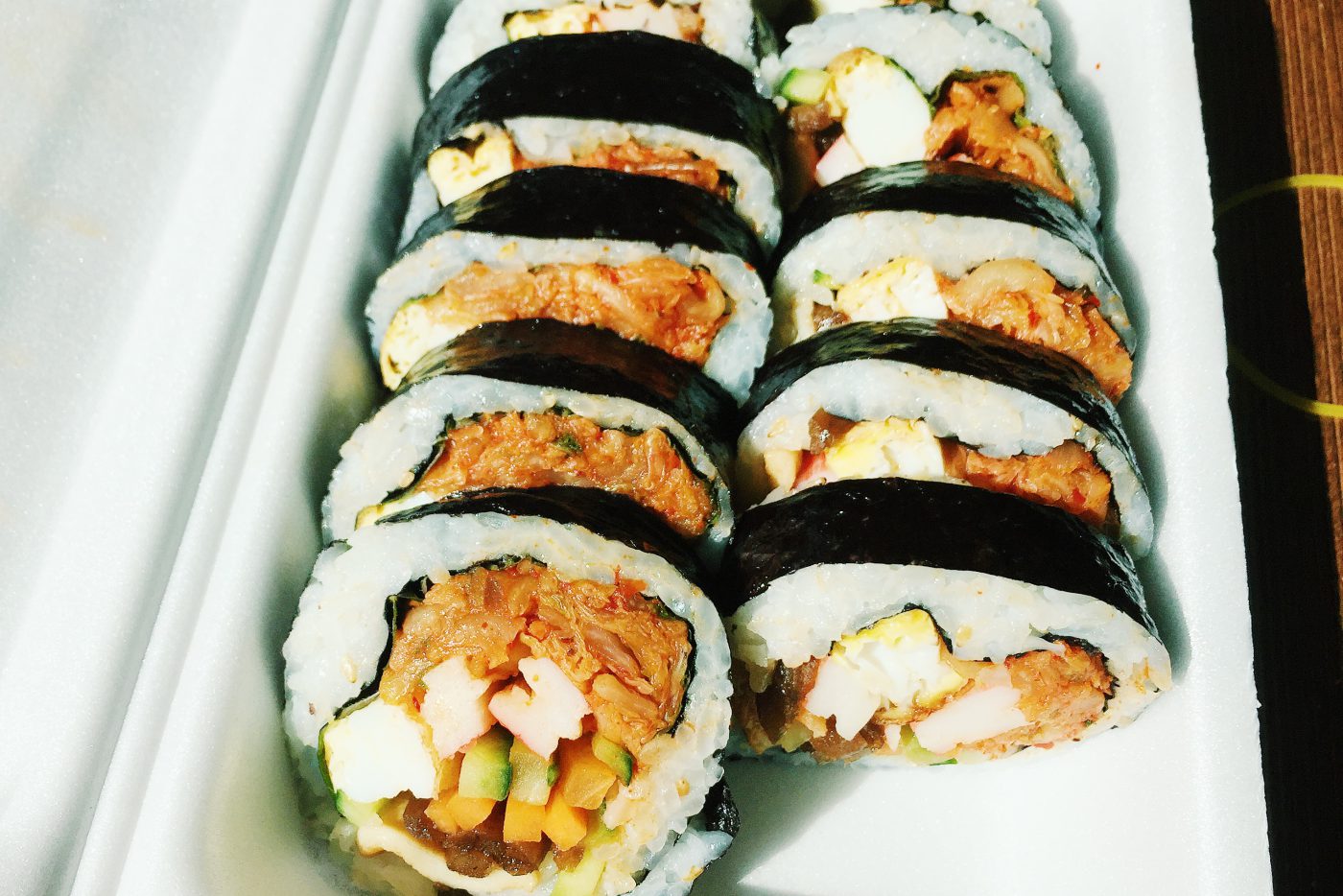
So yes, it looks like maki roll, but completely different. For one, all the ingredients in Gimbap are fully cooked. The hint of sesame oil makes it taste stronger than Japanese maki rolls.
The most classic Gimbap filling is crabstick, kimchi, egg, cucumber and carrots. But you’ll also often find other fillings like tuna or even Bulgogi (marinated thinly sliced beef)
And it’s delicious, of course.
Where to eat Gimbap in Seoul
- Gimgane near Myeongdong
- Ndolpin Gimbap in Dongdaemun
- Modern Gimbap near Gyeongbokgung Palace
- Gimbap Cheonguk near Euljiro 1-ga station
3. Korean Savory Pancake (Jeon – 전)
Trust me on this – These are. SO. good!
Korean pancakes are not sweet, it’s savory. The pancakes are made with rice flour, which gives it a more dense and “bouncy” (or chewy) yet crispy texture than the pancakes you know from Western cooking.
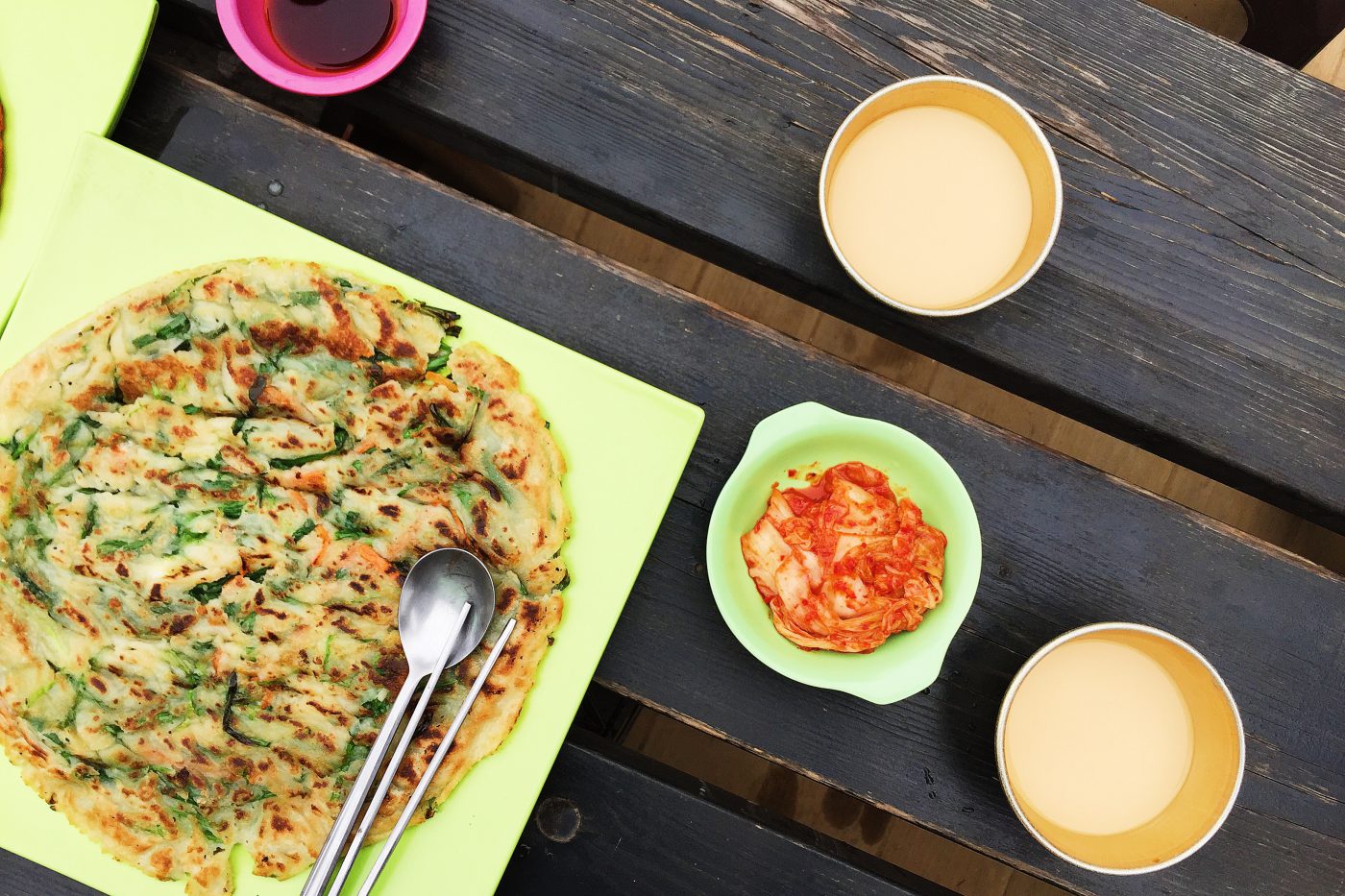
There are three popular kinds of Korean pancake – Green Onion (Pajeon), Seafood (Haemul-pajeon), and Kimchi (Kimchijeon). Korean pancake is usually served pre-sliced into little squares, which you can easily pick up with your chopstick and dip in the light soy sauce that comes served with it.
And, of course, a side of Kimchi is a must to fully enjoy this dish.
Where to eat Korean Pancake in Seoul
- Seoul Jijimi near Myeongdong
- Sigol Jeonjib near Jongmyo Shrine
4. Korean Soup
I love soup and there is no shortage of hot soup in Korean cuisine, which is why it’s one of my favorite cuisines. Korean soups are not bland. They are packed with flavor, very nutritious, and comforting.

The ones pictured above are some of the most popular types of soup – From left to right:
- Doenjang-jjigae (된장찌개) – Stew made of Korean soybean paste.
- Kimchi-jjigae (김치찌개) – Stew soup made from Kimchi-base, vegetables, and sliced tofu.
- Sundubu (순두부) – Spicy soft tofu soup, my personal favorite! It’s usually served still boiling and with a raw egg on the side, so you can crack it into the soup and let it cook.
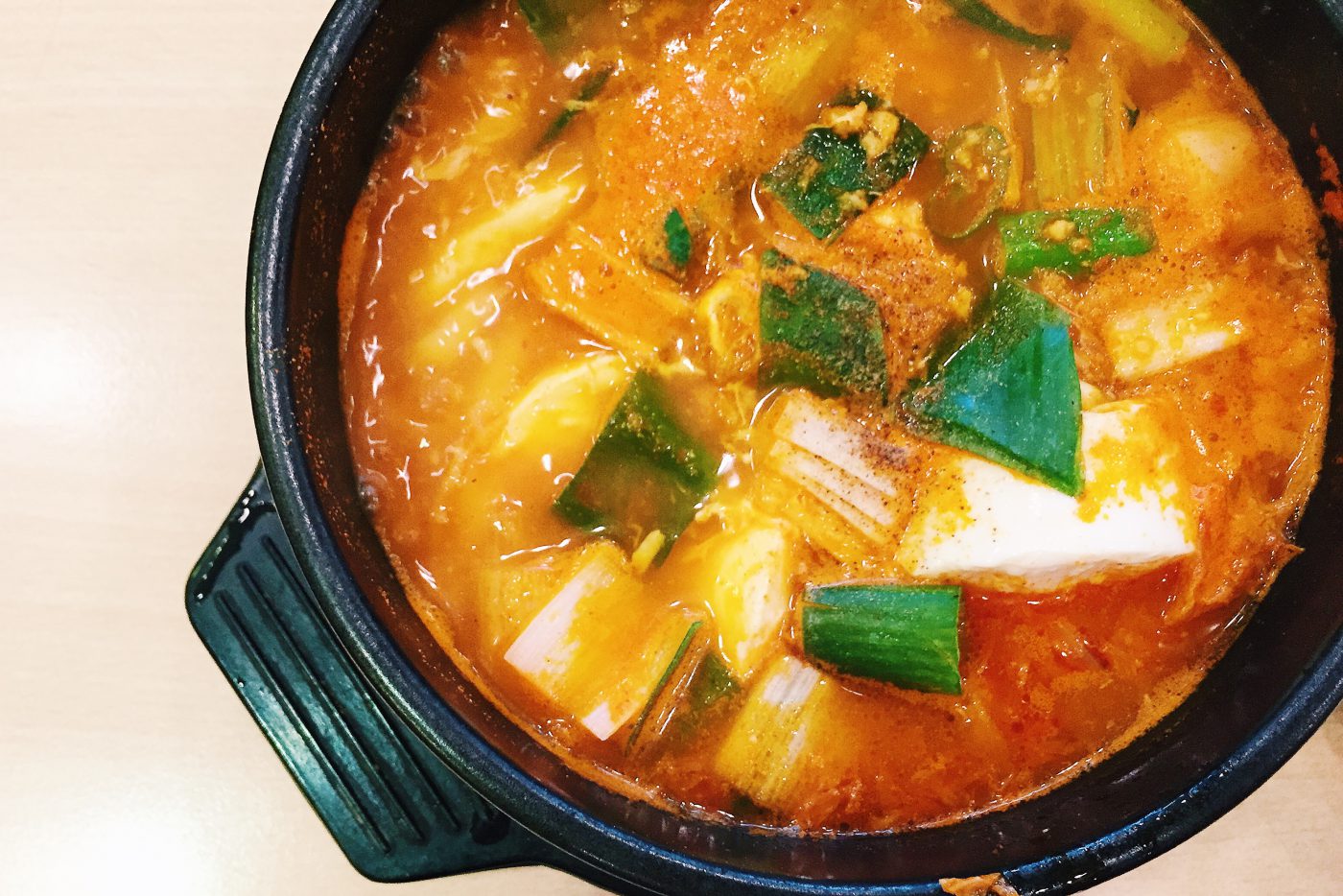
Where to eat Korean Soup in Seoul
- Daehan Sundubu near Gwanghamun Station
- Jaedong Sundubu near Gyeongbokgung Palace
5. Korean Street Food
Given the theme of my Instagram, I don’t think I need to explain how much I love street food. Thankfully there is an abundance of it in South Korea. Go to any popular hangout area in Seoul and you’re bound to find street food vendors lining up.
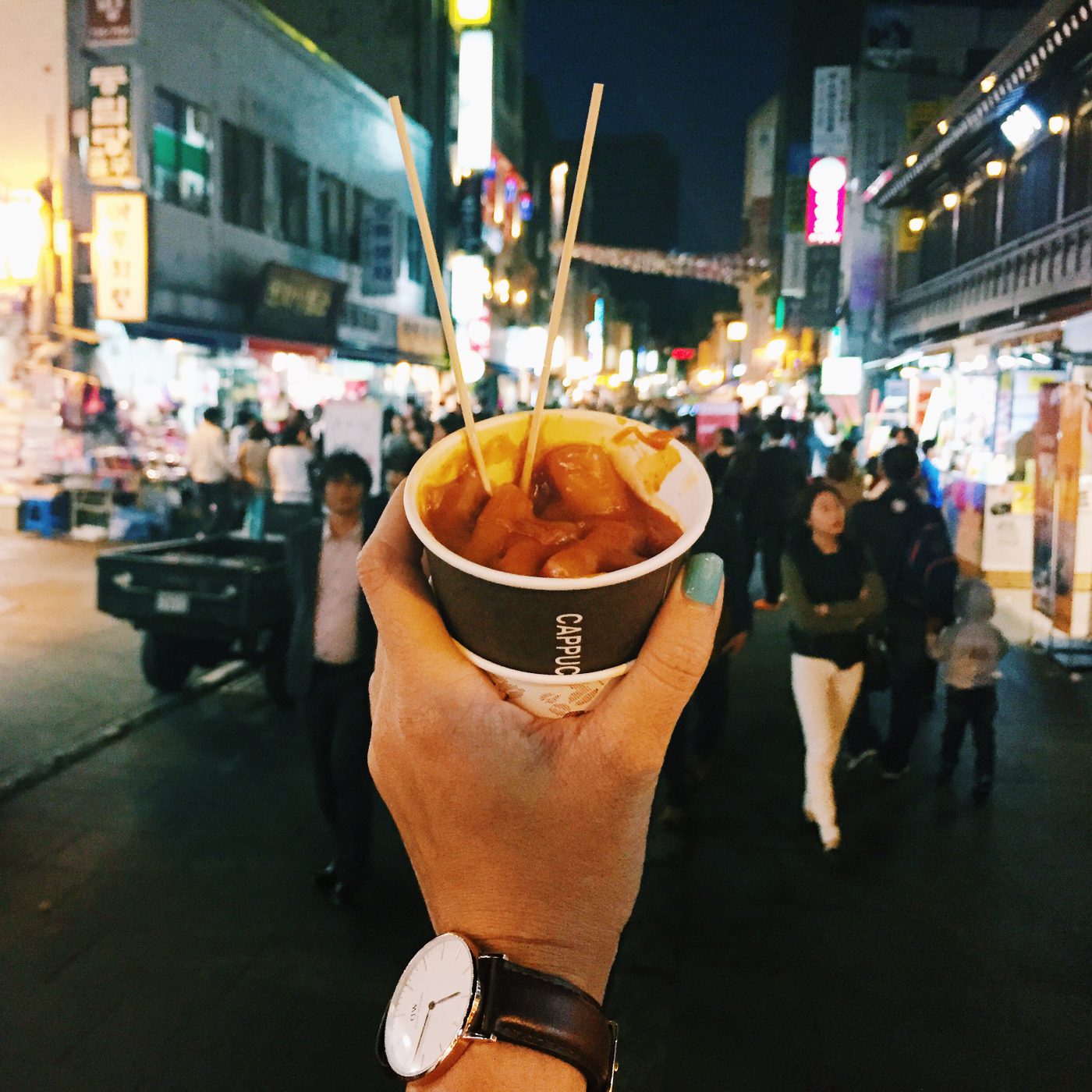
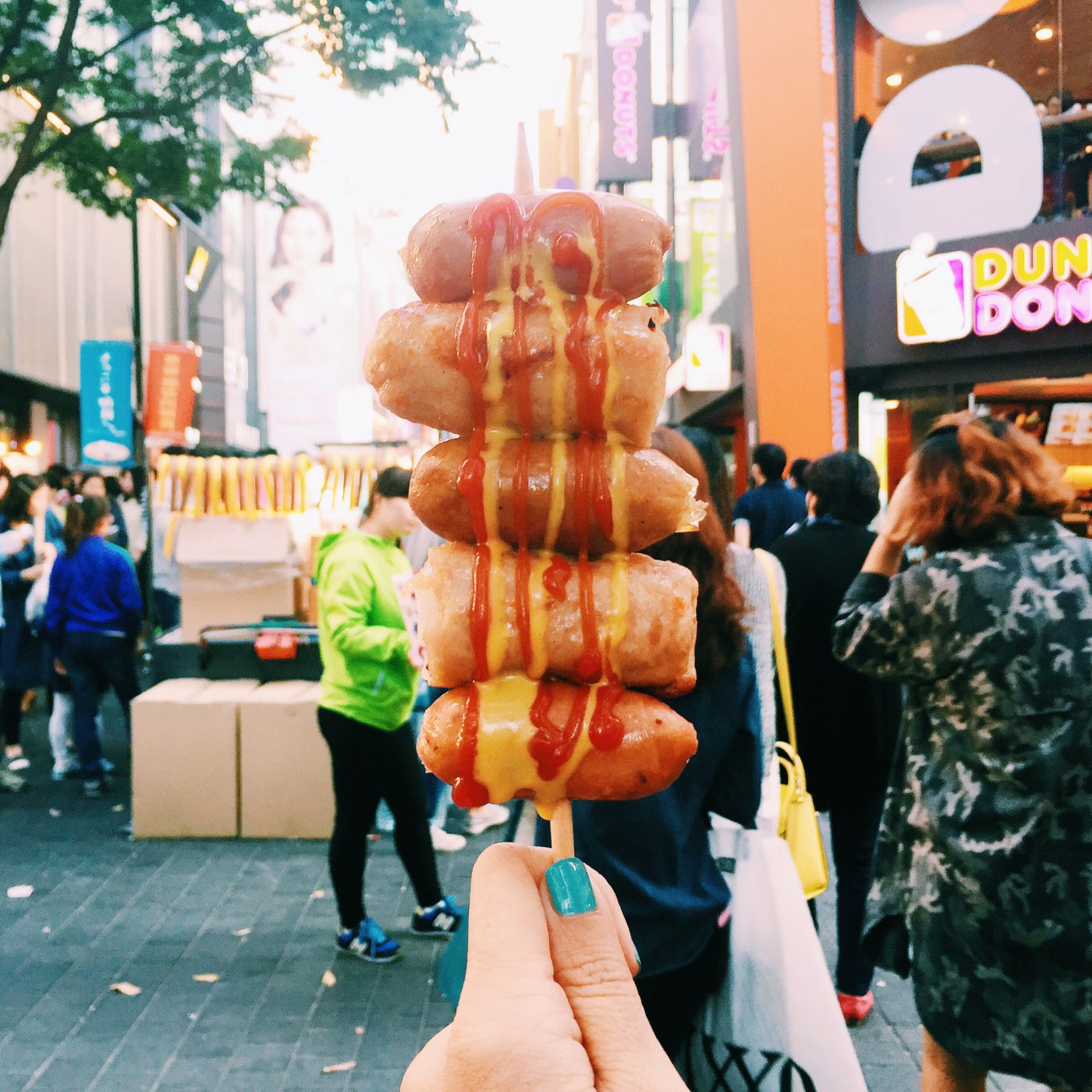
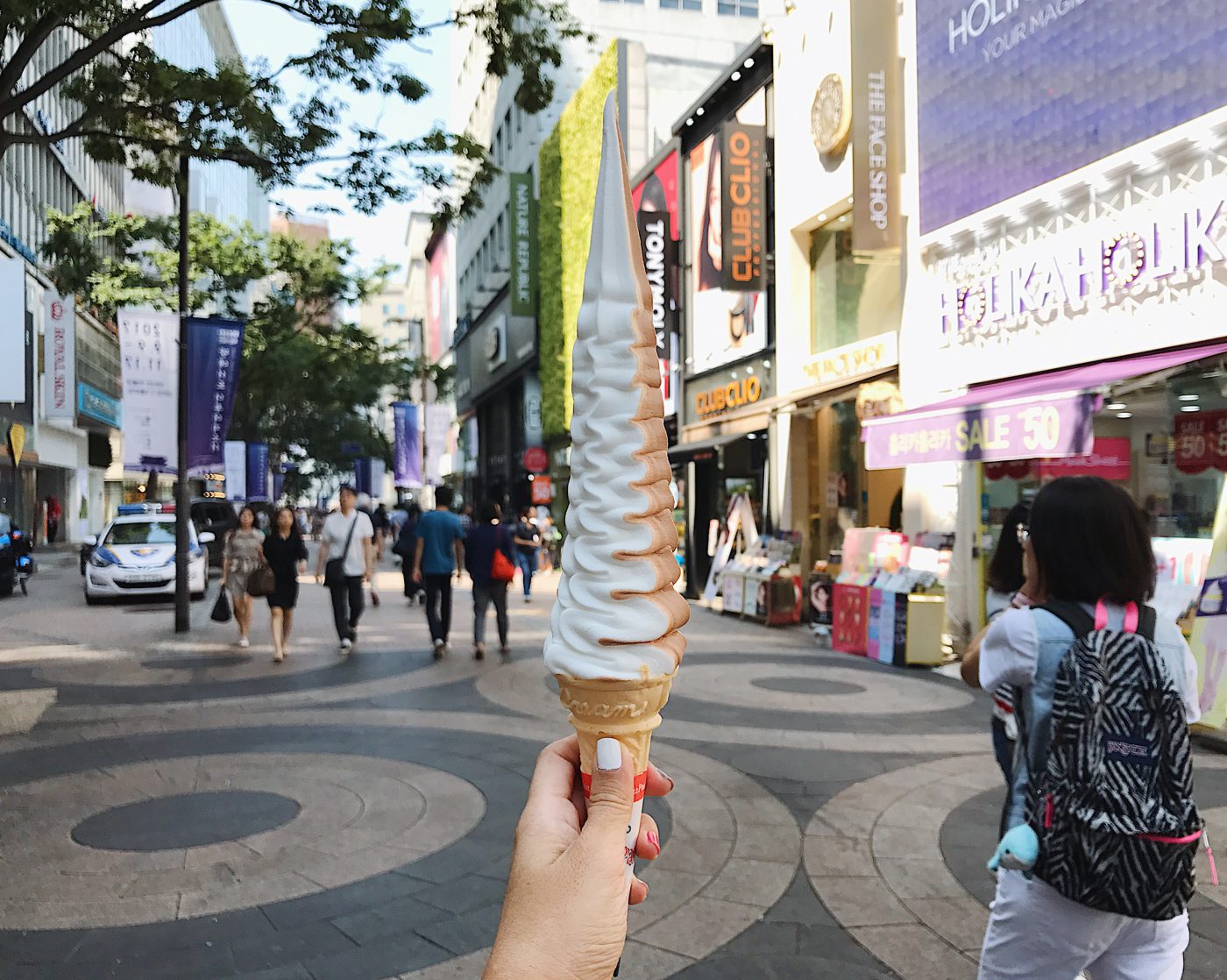
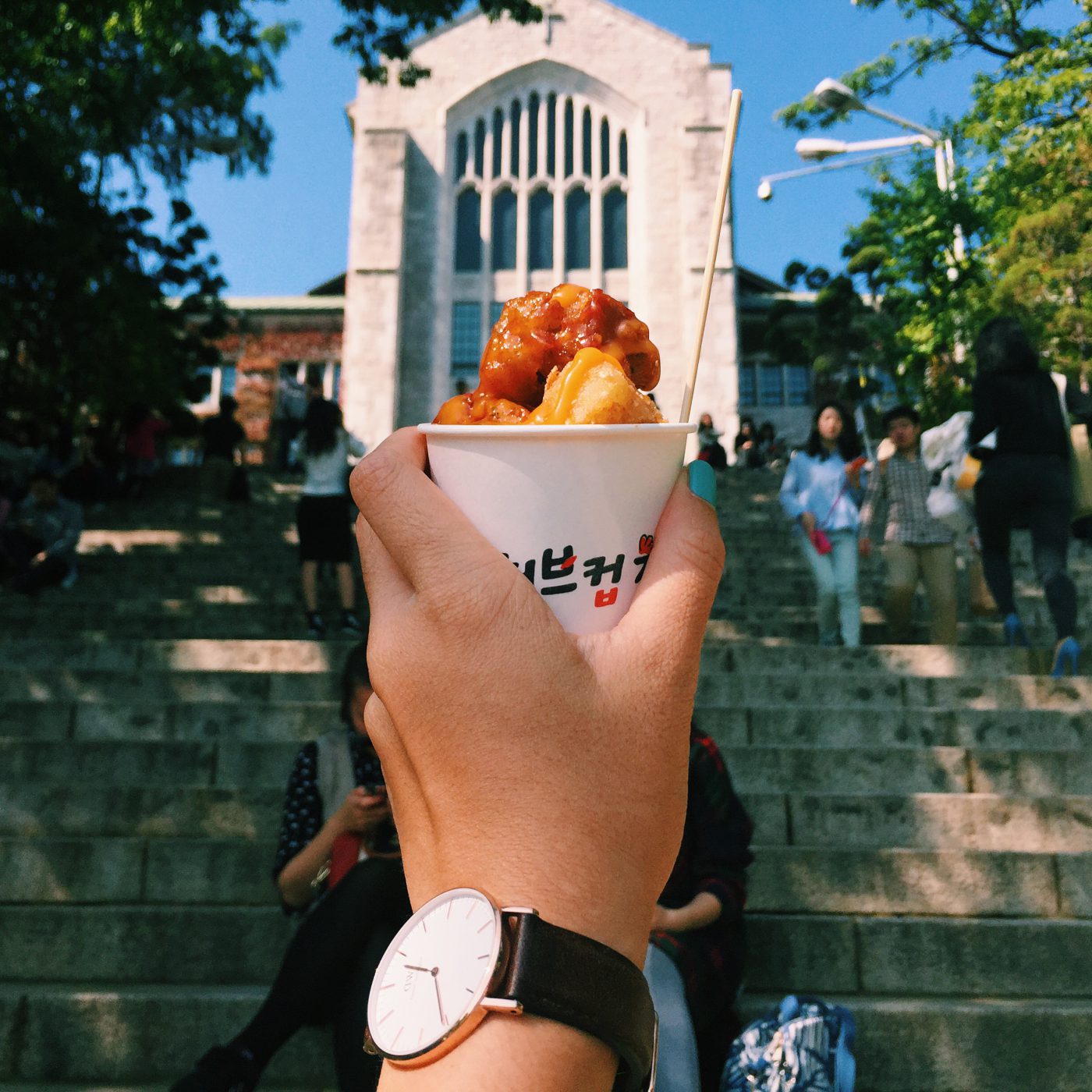
My personal favorites are:
- Spicy Rice Cake (Tteokbokki) – a staple to the Korean street food scene and is a common menu item in restaurants as well, these are literally just boiled rice cakes served in gochujang chili sauce. Sounds simple, but it makes for a comforting snack, especially in the cold winter weather.
- Korean Pancake with Brown Sugar filling (Hotteok) – if you can find this, make sure you get them fresh off the fryer. That first bite into a Hotteok, where the brown sugar filling melts into your mouth is one of the best memories I had from Seoul.
Where to eat Korean street food in Seoul
- Myeongdong Main Street
- Insadong Main Street
- Hongdae
6. Korean Barbecue (고기구이)
Although Korean BBQ establishments are easy to come across these days, the concept of meat consumption is relatively new to South Koreans. In the past, meat was expensive and viewed as a luxury item, so it was only in the 20th century that Koreans started eating more meat, which led to the popularization of Korean BBQ.
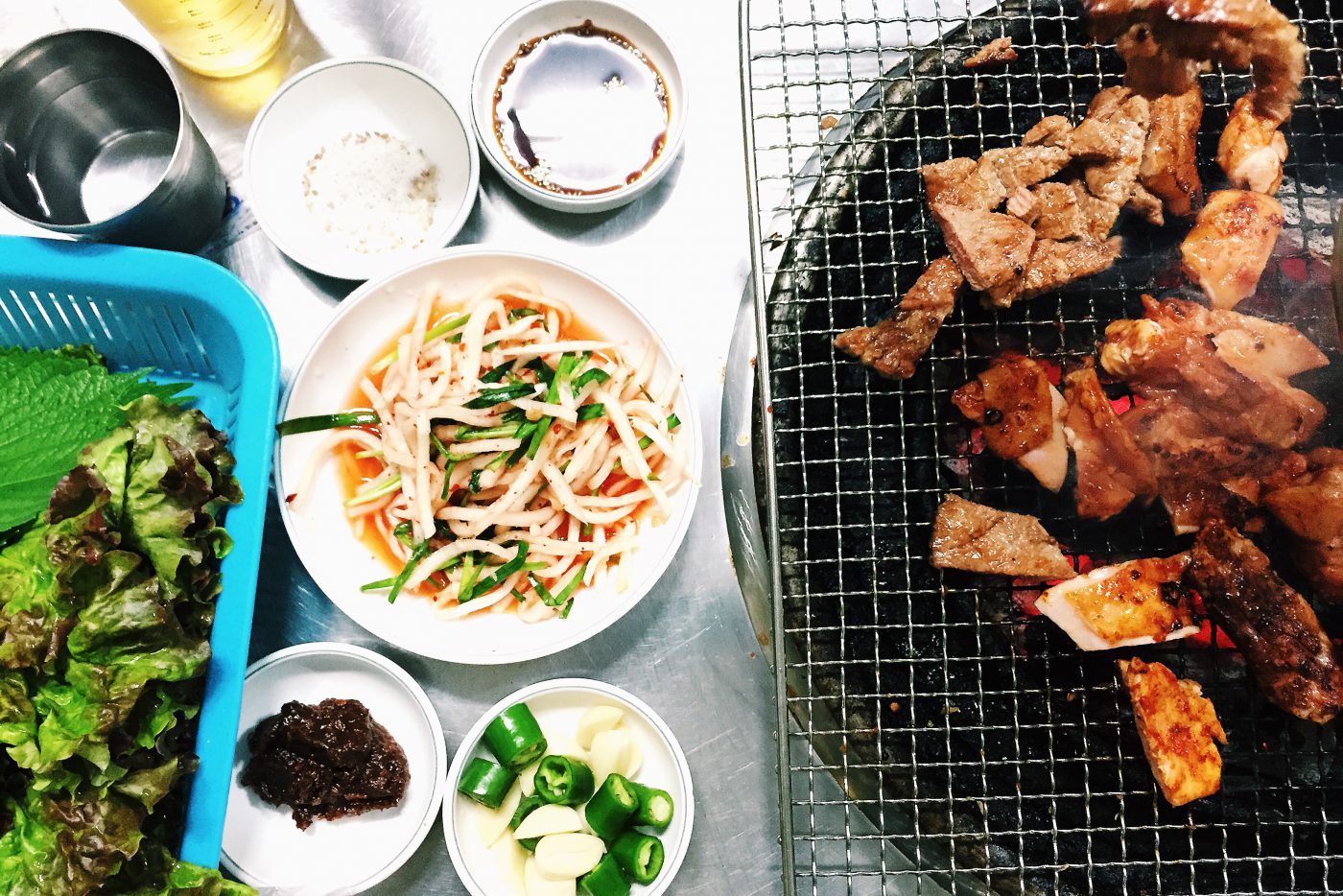
The concept of Korean BBQ thrived mostly overseas. In the 1980s many South Koreans immigrated to the United States, and a good portion ended up settling down in Los Angeles. These Korean immigrants then invented Korean BBQ, which has now flourished throughout the country.
One of the most popular items in a Korean BBQ is “Galbi” aka BBQ Ribs, and there’s a variation of it called “LA Galbi” which is cut thinner than the original Galbi. And yep, you guessed it – LA Galbi was invented by Korean immigrants who lived in Los Angeles.
The way to eat Korean BBQ is to grill the meat yourself (or sometimes the waiter will assist you) to the desired doneness. Once done, you can then cut the meat into little pieces using scissors and put the meat on a piece of lettuce. Add raw garlic, green chili, a bit of Gochujang (Korean chili paste), and sesame oil, wrap it all in lettuce, and then… pop the entire thing in your mouth!
So good. The fresh crunchy lettuce pairs really well with the juicy meat. Also, you eat less carb this way, so that’s healthy right?! (Don’t tell me otherwise)
I once told my friend that if I had to choose, my choice of last meal would be a Korean BBQ feast. And I still stand by that choice to this day.
Where to eat Korean Barbecue in Seoul
- Arirang Restaurant near Myeongdong
- Wangbijib in Myeongdong
- Geumdwaeji Sikdang near Cheong-gu Station
7. Dak Galbi (닭갈비)
Aside from grilled beef and pork belly, there is also a South Korean dish that calls for chicken, rice cakes, and vegetables stir-fried with Gochujang (Korean chili paste) in a huge pan and eaten communally on the table.
It’s called Dak Galbi, a local specialty of Chuncheon, but you’ll see this in other parts of South Korea as well. (A little Korean trivia for you: “dak” means chicken!)
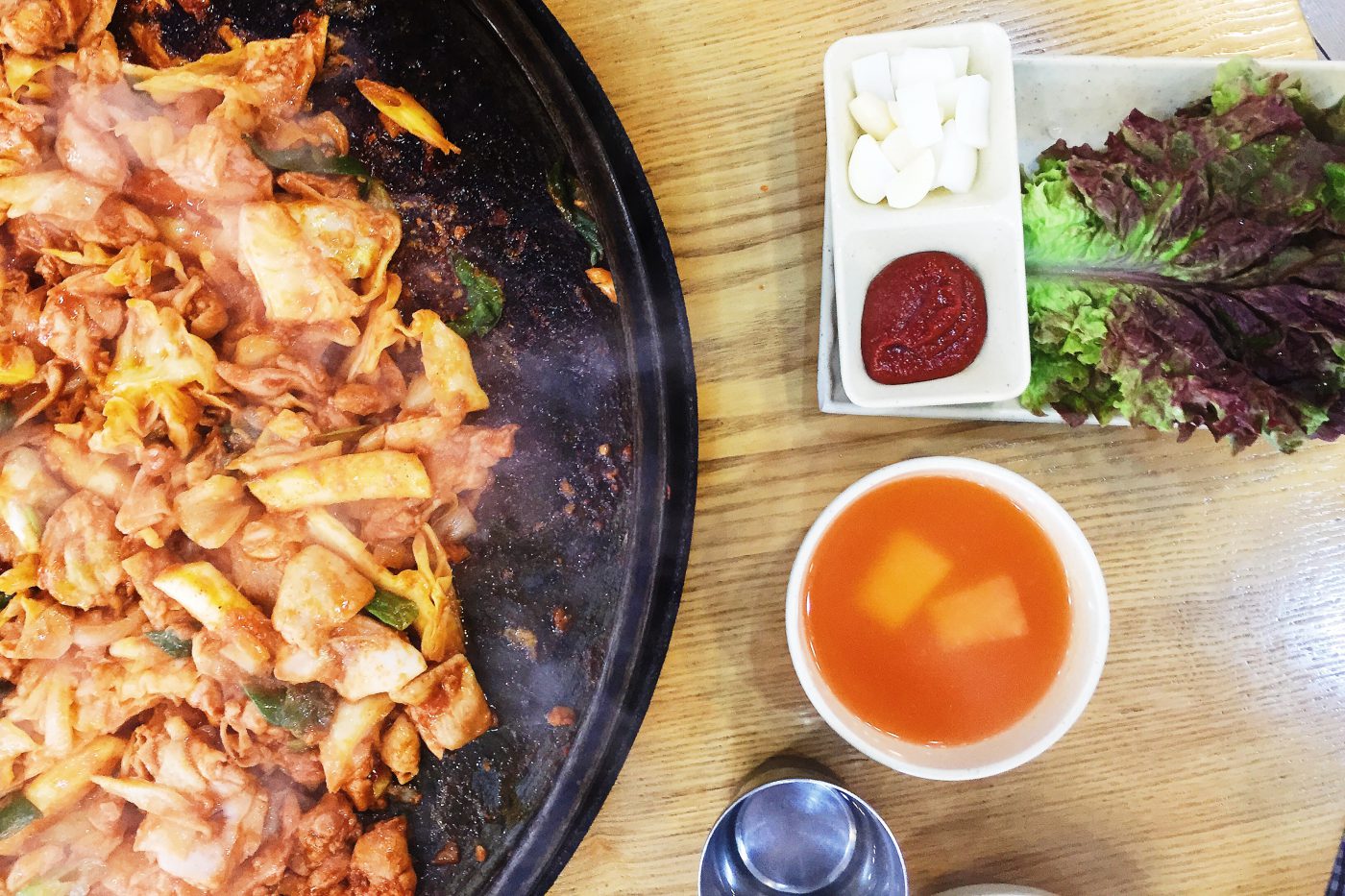
Where to eat Dak Galbi in Seoul
- Eun & Jeong in Myeongdong
- Yoogane in Myeongdong
- Ganchon Charcoal Dakgalbi near Jong-gag Station
8. Beer and Korean Fried Chicken (Chimaek – 치맥)
Humankind has been drinking beer for a very long time. Likewise, humankind has been deep frying chicken and consuming them for a very long time as well. Somewhere along the way, some very smart Koreans figured out that fried chicken and beer go really, really well together and made this an actual drinking tradition.
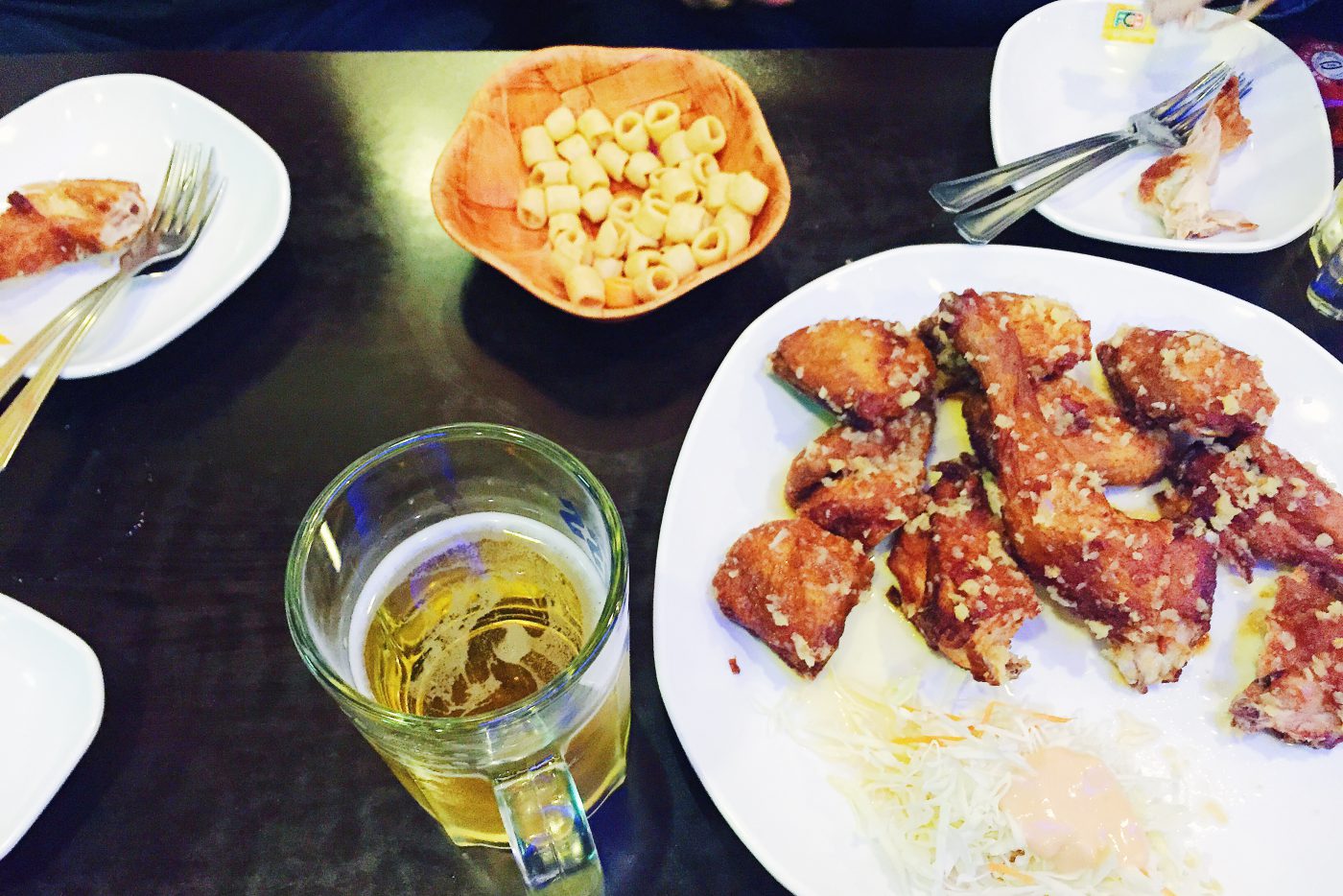
The name is ‘Chimaek‘ is a combination of ‘chicken’ and ‘maekju’, which means ‘beer’ in Korean. Chimaek fits right into the Korean drinking culture (and Koreans drink, A LOT) and it became a popular food item to be delivered. You can even have it delivered to a park if you happen to be out picnic-ing with your friends! So smart.
9. Korean Sparkling Rice Wine (Makgeolli – 막걸리)
Everyone knows soju, but do they know Makgeolli? This rice wine is so light and sweet tasting. Easy to drink, but still quite potent – making it a dangerous beverage to drink if you are a lightweight. I personally can’t get enough of Makgeolli. Too bad it gave me the worst hangover the next day.
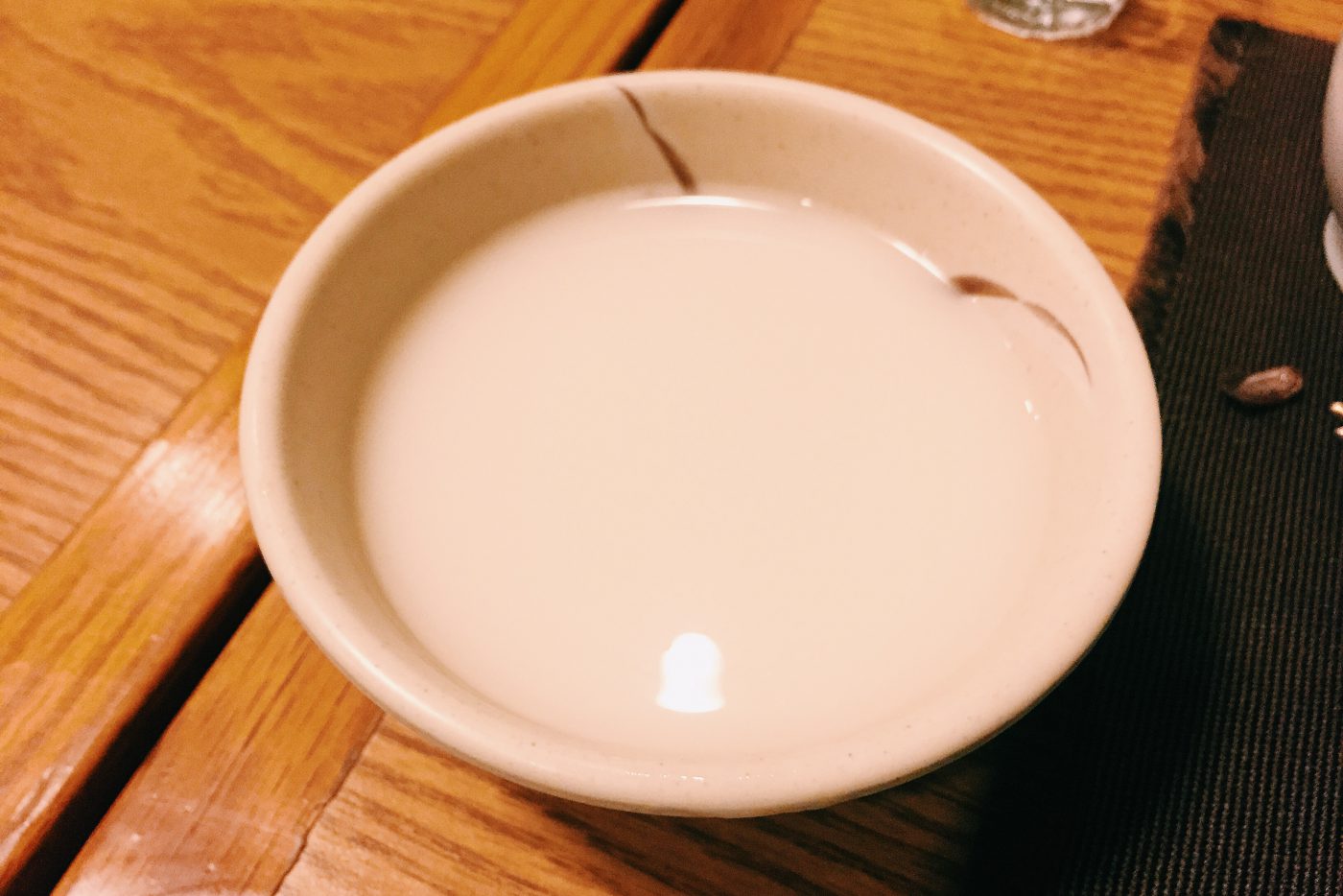
Where to find Makgeolli in Seoul
- Any Korean restaurant, convenience store, or grocery store
10. Korean Shaved Ice (Patbingsu – 팥빙수)
Shaved ice is not a unique thing, but in the shaved ice in Korea tasted so much better than other places. Well, that’s because in Korean shaved ice (called Patbingsu), the ice used is not just any plain shaved ice made from water – it’s actually made from milk!
The milk ice is shaved so thin that it feels like you are eating a milk-flavored (clean) flurry of snow. Usually, Patbingsoo is served with red beans and rice cake as pictured above, or Injeolmi (powdered sesame seeds) and rice cake.
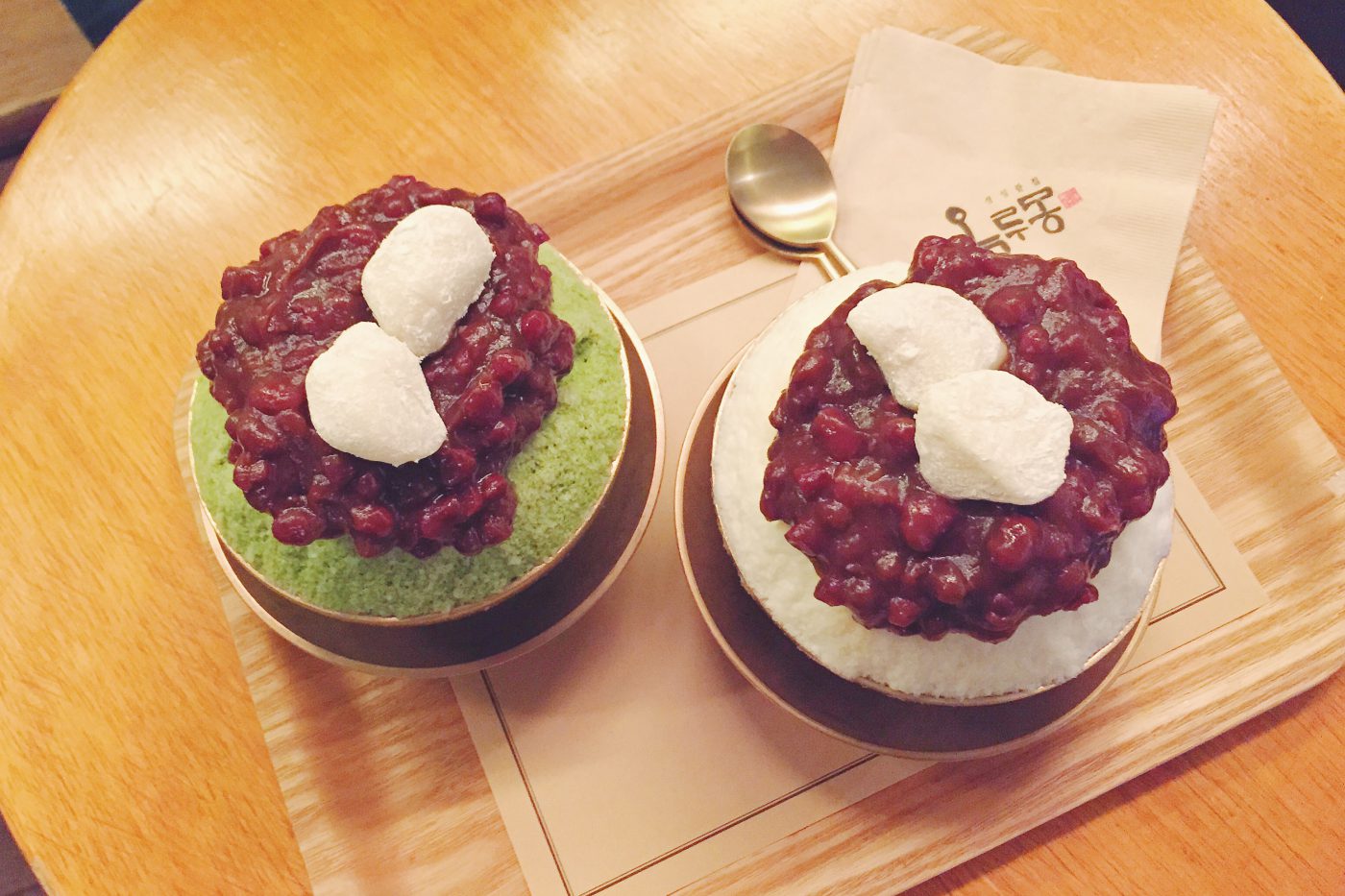
(Yes, there are tons of rice cakes used in South Korean cuisine.)
Where to try Patbingsu in Seoul
- Sulbing in Myeongdong
- Bukhae Bingsu in Dong Dae Mun
11. Banana Milk (바나나맛 우유)
Loved by many Koreans for its nostalgic value and adored by visitors for its delicious taste. My friend told me specifically to get this drink when I arrived in Seoul, and I almost dismissed her. Why would I be trying a store-bought packaged drink when I’m in Korea?
But, I kept seeing this unique bottle packaging everywhere I went. I finally gave up and gave it a try – And I’m so glad I did. I can see why this drink is so popular. I never thought banana and milk would be a good combination, but it really works.
For South Koreans, this drink often reminds them of childhood since it’s a popular choice for kids.
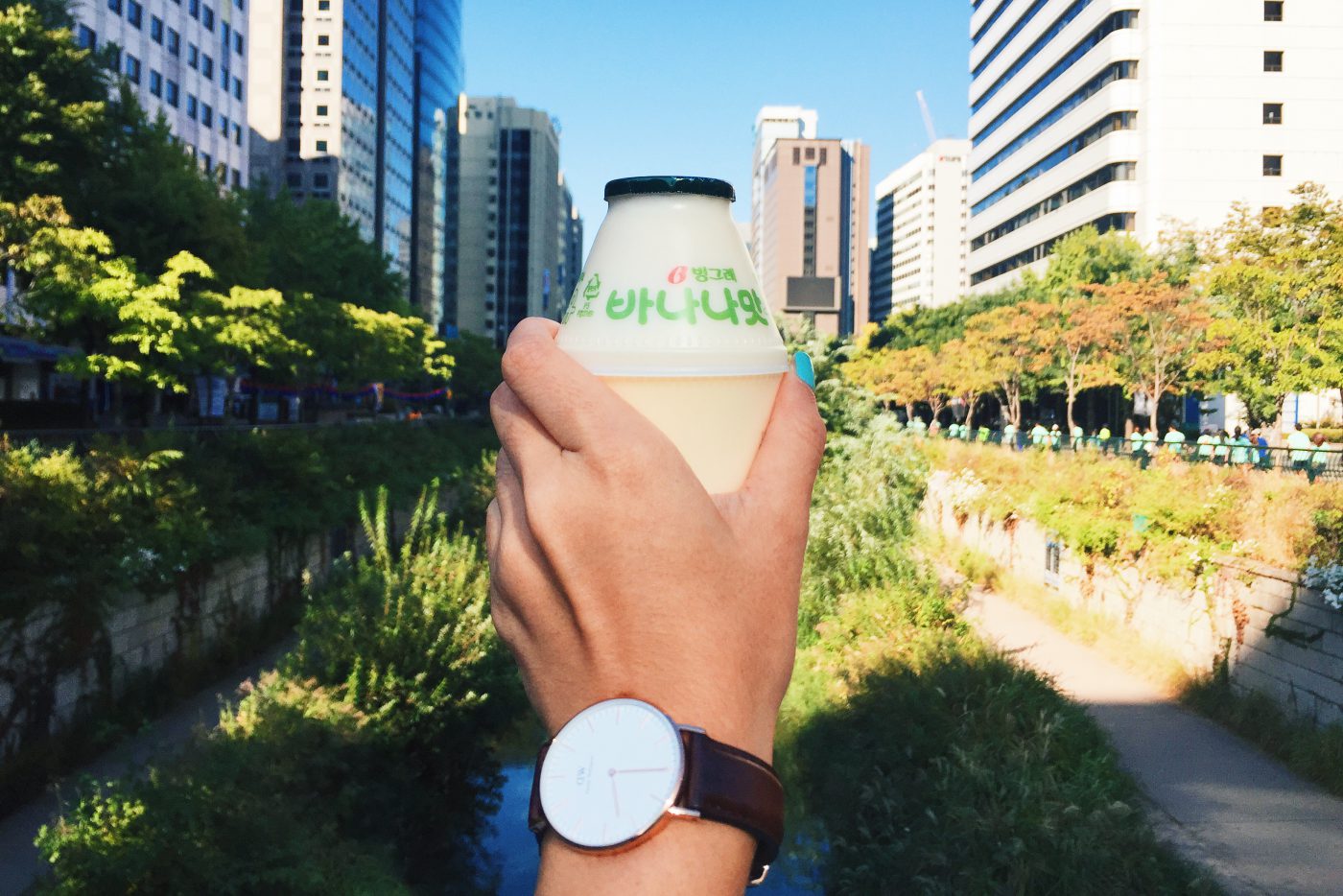
Where to find Banana Milk in Seoul
- Any convenience store in Seoul will carry this beloved drink!
12. Korean Knife-cut Noodle Soup (Kalguksu – 칼국수)
Kalguksu is a traditional Korean soup noodle, where the noodle is often handmade from wheat flour and cut with knives. Kalguksu noodle is very unassuming and it looks quite plain, but packs a punch! The handmade noodle has that perfect slippery bouncy texture and the broth is very flavorful.
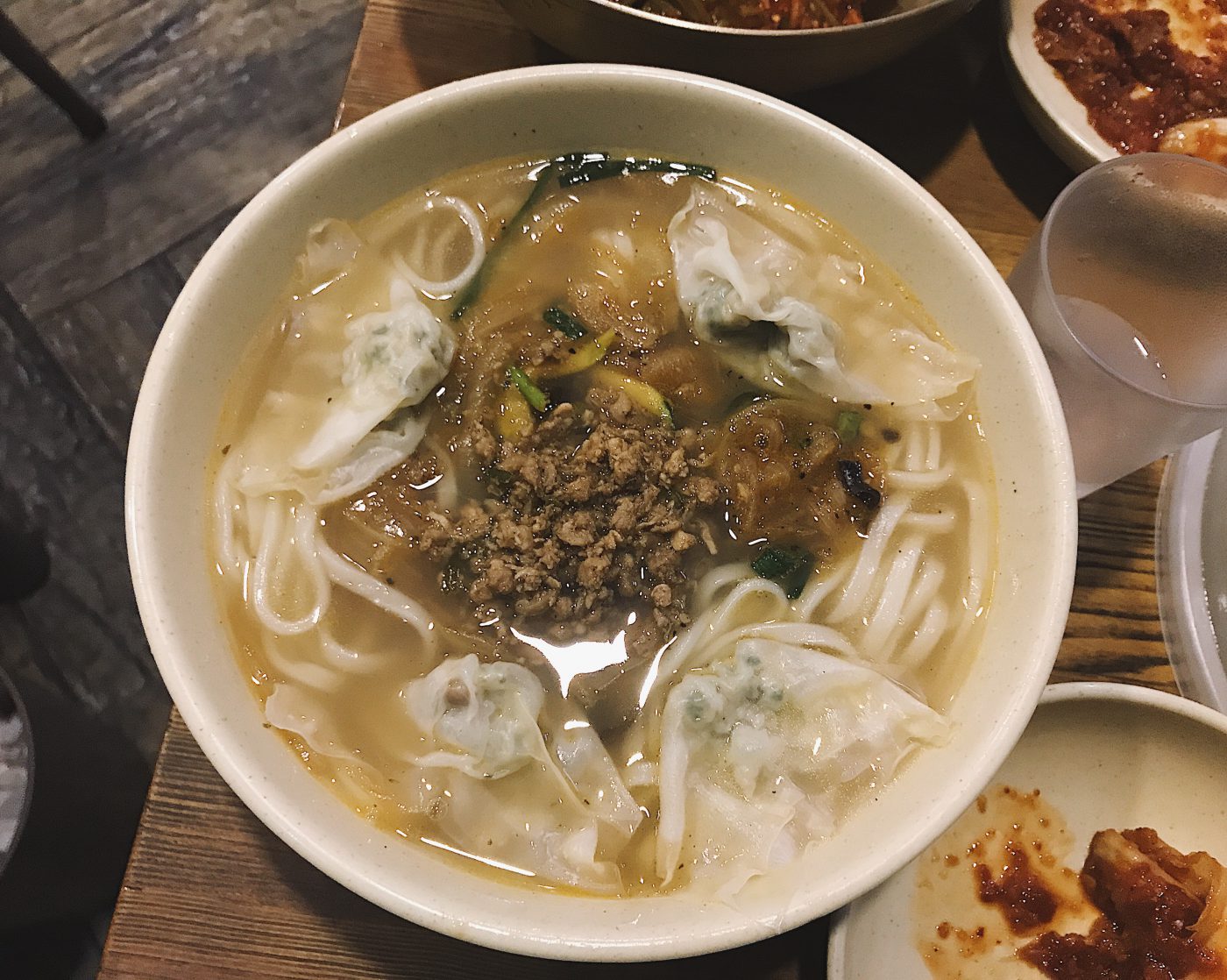
Where to eat Kalguksu in Seoul
- Myeongdong Kyoja in Myeongdong
- Hwangsaengga Kalguksu near Gyeongbokgung Palace
And that’s all my favorite, must-try food and drinks while you are in South Korea! If you want more recommendations on Seoul, I have these posts you might want to check out:
- Affordable Value-for-Money Restaurants in Seoul – A guide to Michelin Bib Gourmand in Seoul
Where to stay in Seoul
I’ve been to Seoul twice and both times I stayed in Myeongdong. And I would definitely stay in this area again.
Myeongdong is convenient for so many reasons: it’s easy to get to from the airport, it’s where all the shopping is, and it’s one of the major stations in Seoul so it’s easy to get around.
Here are the two places I’ve personally stayed in Myeongdong:
- K Stay Guesthouse Myeongdong – I stayed here twice. Once in a single room and once in a 4-bed dormitory. I highly recommend this place if you don’t care about hotel amenities since it is really cheap, clean, and right in the middle of Myeongdong (3-minute walk from the station!)
- Solaria Nishitetsu Hotel – This hotel is located in one of the few high-rises in Myeongdong. The lobby is located on one of the upper floors and you get an unblocked view of the entire district from your room. The location is also hard to beat, it was less than 3-minute walk from Myeongdong station.
Do you have any Korean dishes you love that I didn’t mention? Comment below and let me know!
Until next time 👋🏻

I’m so excited to try some of these traditional Korean dishes when I visit Seoul! Thanks for sharing this informative post on the best food to eat there.
I go to many places in the world in search of delicious food but I loved that food more until I saw your post I saw your post and I tasted the food you made so, I want to say that my best Good experience now I can taste your post better now I don’t need to go around for taste.
Most of this is not “traditional” Korean food at all, it’s mostly fairly modern fare with some of the older stuff (like gimbap) being from the early 20th century. Susprisingly, patbingsoo may be one of the older foods on this list. Although many parts of Asia have something very similar, and no doubt the dish has changed somewhat, just like the kalguksu has.
I suggest leaving Seoul if you want better food. Dakgalbi should be eaten in Chuncheon (but not on the actual Dakgalbi street). Even something as a great as Dakgalbi has only been around since the 1960s at best.
Omarisu is from Japan, not Korea, and began in the 1970s as a fusion food.
I have lived both in Chuncheon and Seoul (not as an English teacher 🤣), have travelled throughout Korea multiple times, and my partner of nearly a decade is born and bred South Korean.
Hey jae, true that, but even though a dish has not existed for long, if it becomes widely consumed in recent modern time and in family setting, i would still think of it as “traditional”. I did mention some of the dishes were new (see the korean BBQ portion). while not korean myself I’ve had Korean roommates all my life and have benefited from them cooking for me!
Hi, found some videos shared about the traditional chicken in Korea
https://youtu.be/Qpsf8hMxZ30
Can I know where is the best place to eat this in Seoul? What is your recommendation? Thanks
Omuraisu. It’s a food I will love to eat any time I visit South Korea.
I was in Seoul Aptil 2019 and lived it tremendously. I enjoyed the food and shopping. I can’t wait for a return trip.
Thanks for the mouthwatering article! Now i really want to visit South Korea 🙂
My sister dated a Korean and the food they made was so good. I am thinking that one day I will have to Korea.
What a great list. Lots of food to try!
Hanwoo beef
Out of everything on this list, I totally agree. I’ve never tried Kalguksu however but Ddukbokki is the one! I’d also add Jjimdak from Wicked Jjimdak as it is a great dish to share with your friends. Inside the dish, there are glass noodles, chicken, cheese and ddukbokki which was a nice surprise to have.
I’ve never heard of Wicked Jjimdak! I’ll have to look for it!
I miss Korean street food. I would add hotteok (korean pancakes with pumkind seeds filling), in the list. I also wrote one entry on Korean food here: https://hongminh317.wordpress.com/2014/08/21/what-i-ate-in-korea-wiaw-3/
Hotteok is sort of on the list under the Street food category 🙂 If i add all the street foods I loved in Korea, this list is going to be endless! 😀
I wish I could visit all the countries that u visited, by looking at all the food posting that u posted, I was like wow, I love travelling too,not as much as You 😀thank you for posting such mouth watering food from all over the world, it’s so interesting to visit, see and last but not least eating all those delicious foods. Thank you once again👍👍
Thank you so much for your comment! It is very encouraging to hear from who appreciates this little project of mine 🙂
Melissa, I am so happy to see u doing great and having lots of fun ! I am so proud of you. Your old friend, tina
Thanks Tina! Miss you and Ethan!!
God ! I just want to go back in Korea and eat all those amazing dishes ! 🙂
By the way, I love your watch~ Which brand is it ? ^^
Hi Cass, the watch is from Daniel Wellington. You can order it at http://www.danielwellington.com
Yum, this post made me feel so many things (mainly hunger)!
What a beautiful photo!!
Thanks Alice!
Your korean food posting is very interesting! Are you in korea now? I’m korean. ^^
Your instagram is introduced by huffingtonpost korea, today. So I can see your pictures.
HAVE A GOOD TRIP~
Hey Elly, no I was in Korea back in October last year 🙂